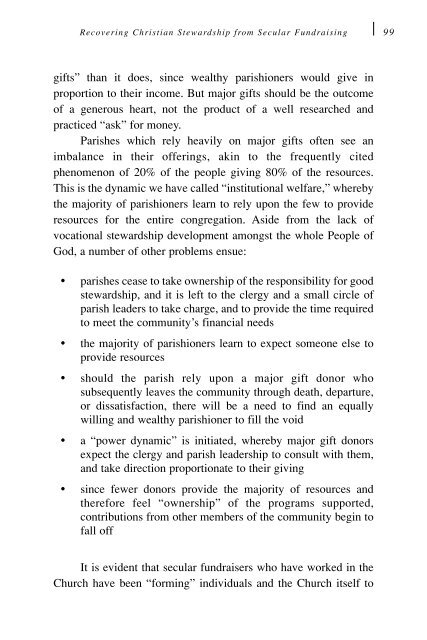Passionate Steward - 10th Anniversary Edition
10th Anniversary Edition of The Passionate Steward - Recovering Christian Stewardship from Secular Fundraising (St. Brigid Press - 2002).
10th Anniversary Edition of The Passionate Steward - Recovering Christian Stewardship from Secular Fundraising (St. Brigid Press - 2002).
Create successful ePaper yourself
Turn your PDF publications into a flip-book with our unique Google optimized e-Paper software.
Recovering Christian <strong>Steward</strong>ship from Secular Fundraising 99<br />
gifts” than it does, since wealthy parishioners would give in<br />
proportion to their income. But major gifts should be the outcome<br />
of a generous heart, not the product of a well researched and<br />
practiced “ask” for money.<br />
Parishes which rely heavily on major gifts often see an<br />
imbalance in their offerings, akin to the frequently cited<br />
phenomenon of 20% of the people giving 80% of the resources.<br />
This is the dynamic we have called “institutional welfare,” whereby<br />
the majority of parishioners learn to rely upon the few to provide<br />
resources for the entire congregation. Aside from the lack of<br />
vocational stewardship development amongst the whole People of<br />
God, a number of other problems ensue:<br />
• parishes cease to take ownership of the responsibility for good<br />
stewardship, and it is left to the clergy and a small circle of<br />
parish leaders to take charge, and to provide the time required<br />
to meet the community’s financial needs<br />
• the majority of parishioners learn to expect someone else to<br />
provide resources<br />
• should the parish rely upon a major gift donor who<br />
subsequently leaves the community through death, departure,<br />
or dissatisfaction, there will be a need to find an equally<br />
willing and wealthy parishioner to fill the void<br />
• a “power dynamic” is initiated, whereby major gift donors<br />
expect the clergy and parish leadership to consult with them,<br />
and take direction proportionate to their giving<br />
• since fewer donors provide the majority of resources and<br />
therefore feel “ownership” of the programs supported,<br />
contributions from other members of the community begin to<br />
fall off<br />
It is evident that secular fundraisers who have worked in the<br />
Church have been “forming” individuals and the Church itself to




